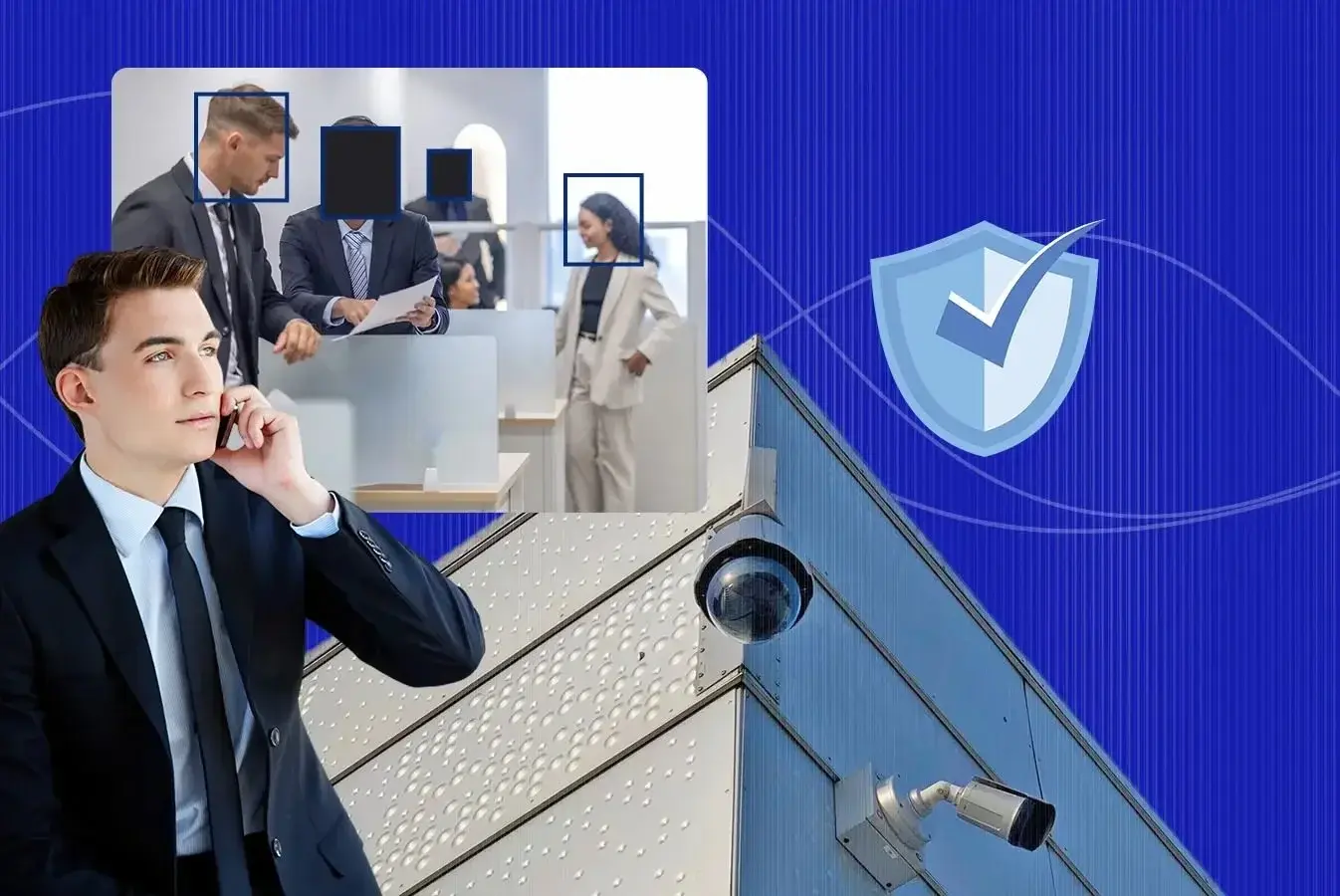The Importance of Redacting Security Camera Footage and Audio Calls for Banks to Maintain Privacy
by Malaika Batool, Last updated: April 10, 2025, ref:

Imagine waking up to the news that your bank, a bastion of your personal and financial security, has suffered a massive data violation while sharing data. Security camera footage and audio calls containing sensitive customer information have been leaked online. Your heart races as you wonder, “Is my financial data safe? What else have they compromised?” This has been the truth for almost 232 million users whose records were compromised in 2,260 record breaches from 2018 to 2023.
In an era where privacy violations dominate headlines, the stakes have never been higher for financial institutions. The pain of such a scenario extends far beyond reputational damage; it affects customer trust, regulatory compliance, and, ultimately, the bottom line.
As compliance officers, security managers, bank managers, IT directors, and legal advisors, your roles are critical in navigating this treacherous landscape. The pressure to protect customer data is palpable, and the consequences of failure can be devastating. In this blog, we’ll explore why banks should prioritize the redaction of security camera footage and audio calls.
Security Vulnerabilities in Banking
In the digital age, banks face unprecedented challenges in safeguarding customer data while sharing. Security cameras and audio recordings are essential tools for maintaining safety and operational efficiency. However, they also serve as potential goldmines for malicious actors. A single lapse in data protection can lead to severe consequences:
- Customer Trust Erosion: Customers expect their banks to safeguard their sensitive information. A privacy violation can cause long-lasting damage to trust, leading to customer attrition.
- Regulatory Scrutiny: Financial institutions operate under stringent regulations. Non-compliance can result in hefty fines and legal ramifications. As of 2024, the average cost of a data breach in the financial industry worldwide was 6.08 million U.S. dollars.
- Operational Disruption: Investigations following a privacy violation can disrupt day-to-day operations, affecting customer service and employee morale.
- Reputational Damage: Negative media coverage can tarnish a bank's reputation for years, leading to a decline in customer base and market share.
- Financial Losses: The costs associated with a privacy violation extend beyond fines. There are also remediation costs, loss of business, and potential lawsuits to consider.
Amplifying the Pain
Let’s delve deeper into each aspect of this problem to truly understand the ramifications of neglecting security measures like redaction.
Erosion of Customer Trust
When customers hear about data exposure their instinct is to question the safety of their personal information. They may question security of the bank.
This sentiment can lead to a swift migration to competitors perceived as more secure. The long-term impact on a bank’s bottom line can be profound, as acquiring new customers often costs significantly more than retaining existing ones.
Regulatory Scrutiny
Regulatory bodies are increasingly vigilant regarding data protection. For example, the General Data Protection Regulation (GDPR) in Europe imposes hefty fines for non-compliance, reaching up to 4% of annual global revenue. Imagine the backlash if a bank is found guilty of exposing customer data through unredacted footage. The repercussions could include:
- Significant fines: These can cripple a bank’s finances.
- Increased regulatory oversight: This can lead to more stringent audits and compliance checks.
Operational Disruption
A privacy violation doesn’t just impact customers; it can disrupt daily operations. Banks may need to halt services, conduct investigations, and implement new security measures. This disruption can lead to:
- Decreased customer satisfaction: Delays in service can frustrate customers.
- Lower employee morale: A violation can create a culture of fear and uncertainty among staff.
Reputational Damage
Negative media coverage following a violation can create a lasting stain on a bank’s reputation. The narrative often shifts from a singular incident to a broader discussion about the bank’s commitment to security. A tarnished reputation can lead to:
- Loss of business opportunities: Partners may hesitate to engage with a bank perceived as insecure.
- Negative social media sentiment: Today’s customers are vocal; a trending hashtag can amplify negative sentiments quickly.
Financial Losses
The financial repercussions of a privacy violation are multifaceted. Banks often face costs associated with:
- Investigation and remediation: Identifying the violation, informing affected customers, and implementing new security measures can be costly.
- Potential lawsuits: Customers may seek compensation for the loss of personal data, leading to legal fees and settlements.
Redacting Security Cameras Footage & Audio Calls
Now that we’ve laid bare the problems and amplified the pain points, let’s explore the solution: redacting security camera footage and audio calls.
What Is Redaction?
Redaction involves removing or obscuring sensitive information from recordings before they are stored or shared. This practice is crucial in protecting customer privacy and ensuring compliance with regulations. Here’s how redaction can alleviate the pain points outlined earlier:
- Restoring Customer Trust: By proactively redacting sensitive information, banks can assure customers that their privacy is a priority. Communicating these measures can enhance customer loyalty and confidence.
- Ensuring Regulatory Compliance: Compliance officers can sleep easier knowing that redacted footage aligns with data protection regulations. This proactive approach minimizes the risk of costly fines.
- Streamlining Operations: Automating the redaction process can free up resources, allowing staff to focus on core business functions. This can lead to improved efficiency and service quality.
- Safeguarding Reputation: Banks that take the initiative to redact sensitive data position themselves as industry leaders in security. This reputation can serve as a competitive advantage.
- Mitigating Financial Risks: The costs associated with a violation can be mitigated by investing in redaction technology. While there may be upfront costs, the long-term savings can be substantial.
Implementing Effective Redaction Strategies
To reap the benefits of redaction, banks must adopt effective strategies. Here are some best practices to consider:
1. Invest in Advanced Technology
Utilizing advanced redaction tools can streamline the process, making it faster and more accurate. Look for software that offers features like:
- Automated redaction: Machine learning algorithms can identify and redact sensitive information automatically in real time.
- Customizable settings: Tailor the redaction process to custom needs with various redaction styles, ensuring that all sensitive data is appropriately managed.
- Spoken PII Redaction: Invest in software that offers redaction of spoken PII. These software are designed to detect voices within audio and video files and redact as per the convivence of the users.
- AI-powered Transcription: Modern Redaction software leverage AI to transcribe audios and videos from multiple languages. These transcription van be translated into even more languages to enhance the overall redaction process and ensure privacy and compliance.
2. Develop Comprehensive Policies
Creating clear policies around the handling of security footage and audio calls is essential. This includes:
- Defining what constitutes sensitive information: Identify the types of data that require redaction, such as customer names, account numbers, and personally identifiable information (PII). Redaction software also allow for setting custom patterns in that can be used by Banks to set for account numbers, emails, SSNs and other PII that the customer usually submit to the banks.
- Establishing protocols for review and approval: Designate individuals or teams responsible for overseeing the redaction process.
3. Train Staff
Educating employees on the importance of redaction and proper procedures is vital. This training should cover:
- The significance of protecting customer data: Understanding the impact of privacy violation can motivate employees to adhere to redaction policies.
- How to use redaction tools effectively: Hands-on training can empower staff to utilize technology confidently.
4. Regularly Review and Update Practices
The landscape of data security is constantly evolving. Regularly reviewing and updating redaction practices is essential to keep pace with emerging threats and regulatory changes. Consider:
- Conducting audits: Periodically assess the effectiveness of redaction measures to identify areas for improvement.
- Staying informed about regulatory changes: Keeping abreast of changes in data protection laws ensures ongoing compliance.
The Path Forward
As the financial landscape becomes increasingly complex, banks must prioritize the protection of customer data. By redacting security camera footage and audio calls, institutions can mitigate risks, enhance customer trust, and comply with regulations.
The urgency to act is clear. Embracing redaction not only safeguards sensitive information but also positions banks as leaders in the fight against privacy and compliance violations. As we move forward in this digital age, proactive measures will distinguish forward-thinking banks from their competitors.
People Also Ask
What is the purpose of redacting security camera footage?
Redacting security camera footage is designed to protect sensitive customer information by obscuring or removing identifiable data before it is stored or shared.
How can redaction improve customer trust?
By demonstrating a commitment to protecting customer privacy through redaction, banks can enhance customer confidence in their security measures.
What are the regulatory implications of failing to redact sensitive information?
Failing to redact sensitive information can result in regulatory penalties, increased scrutiny, and reputational damage, as well as potential lawsuits from affected customers.
Can redaction tools handle both video and audio data?
Yes, many advanced redaction tools can handle both video and audio data, allowing for comprehensive protection of sensitive information across various formats.
What types of sensitive information should be redacted?
Sensitive information includes customer names, account numbers, social security numbers, and any other personally identifiable information (PII).
Jump to
You May Also Like
These Related Stories

How AI Redaction Software Helps Resolve Data Privacy Challenges

Ensuring Employee Survey Confidentiality with PII Redaction software


No Comments Yet
Let us know what you think